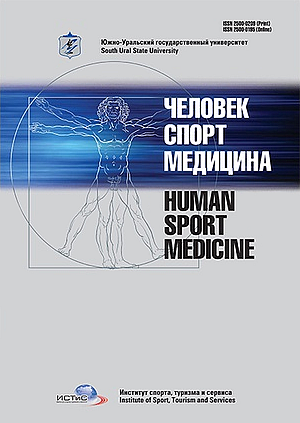ACUTE PHASE PROTEINS IN FATAL RISK PREDICTION IN MEN AGED 60 AND OLDER SUFFERING FROM ISCHEMIC HEART DISEASE
Keywords:
ischemic heart disease, men, elderly age, acute phase protein, survival rate
Abstract
Aim. To study the role of acute phase proteins for 10-year survival rate in men aged 60 and older with IHD. Materials and Methods. 167 men aged 60 and older (mean age – 76.0 ± 0.5) with confirmed IHD were under observation. The study did not include patients after revascularization and reconstructive surgery of coronary arteries. All participants were subkected to the complex assessment of clinical-functional state of the cardiovascular system and biochemical and immunologic examination. 10-year prospective study considering death records was performed. Statistical analysis was carried out using statistical programs STATISTICA 6.0 and SPSS 13.0. Results. The results of 10-year death probability analysis in men aged 60 and older with IHD have shown that risk of death is higher at the increased concentration of acute phase proteins – Creactive protein, fibrinogen, increased concentration of beta-globulin protein fraction bearing atherogenic lipid fractions, and gamma-globulin fraction reflecting the stimulated production of antibodies participating in formation of atherogenic lipoprotein complexes – immunoglobulins G. Conclusion. 10-year death rate in men aged 60 and older with IHD is higher at the increased concentration of acute phase protein – C-reactive protein, which makes it possible to use this indicator for fatal risk stratification in men aged 60 and older with IHD.References
1. Aronov D.M., Lupanov V.P. [Some Aspects of the Pathogenesis of Atherosclerosis]. Ateroskleroz i dislipidemii [Atherosclerosis and Dyslipidemia], 2011, no. 1, pp. 68–73. (in Russ.)
2. Nasonov E.L., Panyukova E.V., Aleksandrova E.N. [C-Reactive Protein – a Marker of Inflammation in Atherosclerosis]. Kardiologiya [Kardiologiya], 2002, vol. 39, no. 37, pp. 53–62. (in Russ.)
3. Blake G., Ridker P.M. Novel Clinical Markers of Vascular wall Inflammation. Circ. Res., 2001, vol. 89, pp. 763–771. DOI: 10.1161/hh2101.099270
4. Danesh J., Whincup P. Low Grade Inflammation and Coronary Heart Disease: Prospective Study and Updated Meta-Anlises. Br. Med. J., 2000, vol. 321, no. 29, pp. 199–204. DOI: 10.1136/bmj.321.7255.199
5. Libby P., Ridker P.M. Novel Inflammatory Markers of Coronary Risk. Circulation, 1999, vol. 100, pp. 1148–1150. DOI: 10.1161/01.CIR.100.11.1148
6. Yarnell J., McCrum E. Association of European Population Le Levels of Thrombotic and Inflammatory Factors with Risk of Coronary Heart Disease: the MONICA Optional Haemostasis Study. Eur. Heart J. 2005, vol. 26, pp. 332–342. DOI: 0.1093/eurheartj/ehi052
2. Nasonov E.L., Panyukova E.V., Aleksandrova E.N. [C-Reactive Protein – a Marker of Inflammation in Atherosclerosis]. Kardiologiya [Kardiologiya], 2002, vol. 39, no. 37, pp. 53–62. (in Russ.)
3. Blake G., Ridker P.M. Novel Clinical Markers of Vascular wall Inflammation. Circ. Res., 2001, vol. 89, pp. 763–771. DOI: 10.1161/hh2101.099270
4. Danesh J., Whincup P. Low Grade Inflammation and Coronary Heart Disease: Prospective Study and Updated Meta-Anlises. Br. Med. J., 2000, vol. 321, no. 29, pp. 199–204. DOI: 10.1136/bmj.321.7255.199
5. Libby P., Ridker P.M. Novel Inflammatory Markers of Coronary Risk. Circulation, 1999, vol. 100, pp. 1148–1150. DOI: 10.1161/01.CIR.100.11.1148
6. Yarnell J., McCrum E. Association of European Population Le Levels of Thrombotic and Inflammatory Factors with Risk of Coronary Heart Disease: the MONICA Optional Haemostasis Study. Eur. Heart J. 2005, vol. 26, pp. 332–342. DOI: 0.1093/eurheartj/ehi052
References on translit
Published
2016-09-01
How to Cite
Tantsyreva, I., & Shamurova, Y. (2016). ACUTE PHASE PROTEINS IN FATAL RISK PREDICTION IN MEN AGED 60 AND OLDER SUFFERING FROM ISCHEMIC HEART DISEASE. Human. Sport. Medicine, 16(3), 19-24. https://doi.org/10.14529/hsm160303
Issue
Section
Clinical and Experimental Medicine
Copyright (c) 2019 Human. Sport. Medicine

This work is licensed under a Creative Commons Attribution-NonCommercial-NoDerivatives 4.0 International License.















